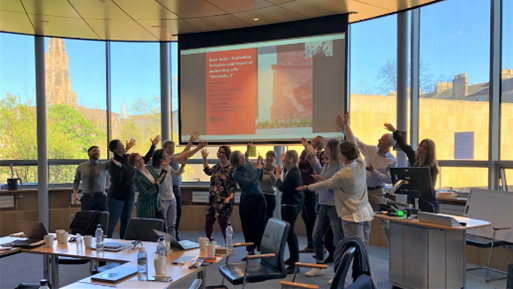The year is almost over. 2022 was not just another year for the Leiden Madtrics blog, but came with quite a variety of blog posts. We (the blog team) had a lot of fun editing all of them and are proud of our authors. They did an amazing job. At the same time, this year diversified our social media presence: Leiden Madtrics, along with CWTS, can now be found on Mastodon as well, while the institute also launched its own Mastodon instance.
Messaggi di Rogue Scholar

I founded Liberate Science in October 2019 to realise ResearchEquals. Thanks to the Shuttleworth Foundation’s support over the past three years, ResearchEquals now exists and we have been in production for 10 months — since then we’ve had zero downtime! We will continue to develop ways for you to make your research work visible and are committed to doing that for the long haul.

Discover DOCI, the OpenCitations Index of Datacite open DOI-to-DOI citations

The past six months we consulted for the Meta-Research Center on their NWO Open Science Fund project, aimed at detecting privacy violations in datasets. You can now use the web app we built and the R package we developed to scan your datasets and prevent sharing privacy violations. Together with prof. dr. Jelte Wicherts and dr. Rick Klein, we wrote the original grant proposal to improve scanning for potential privacy violations in datasets.

This September, the 26th International Conference on Science, Technology and Innovation Indicators (STI 2022) was held in Granada, Spain and the ScholCommLab left its mark at the first in-person edition of the conference since the COVID-19 pandemic.
Ever since Elon Musk took over Twitter, there has been a steady stream of Twitter users looking for alternatives, such as Mastodon. This alternative is part of a larger federation of social media services called the fediverse, which includes not only a Twitter-like platform such as Mastodon, but also Instagram-like photo sharing and TikTok-like video sharing platforms for example.

We are piloting a four week peer learning programme for early career researchers in February 2023. Composed of seven sessions, ResearchEquals Cohorts will learn how to use ResearchEquals to share their research process and connect with peers going through the same learning process. A peer learning programme helps learn things in a social setting, where doing it alone can be too intimidating, too much, or not fun enough.
In June of this year, the Open Research Funders Group (ORFG) published an open letter to the wider academic community with a call towards improving research output tracking. Funding acknowledgments were a particular focal point. In the previous blog post in this series, we already addressed several issues at play in funding acknowledgment data sets.

By Alice Fleerackers (Simon Fraser University) and Lauren A Maggio (Uniformed Services University of the Health Science) A story on gender inequity in scientific research industries. A deep dive into the daily rhythms of the immune system. A look at vaccine effectiveness for COVID-19 variants.

Researchers collaborate across borders and continents. Students go on exchange and go study abroad. Nothing new so far. Yet formalised international strategic partnerships between universities are more recent. These agreements include both research and education and cover a range of departments. And they are expected to contribute to strategic goals and have great impact.